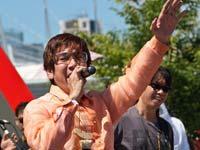After Little Saigon, comes Pinoy Town

Filipinos are asking Vacouver City Hall to officially declare an area in the city a “Pinoy Town”.
Jojo Quimpo of Aklan, who is based in Vancouver, said that petition papers have been distributed around the city.
Quimpo said the petition papers are available for signing in all major Filipino-owned stores in Vancouver.
The proposed “Pinoy Town” is located in Fraser Street between Kingsway and 33rd Avenue of Vancouver. The area is called “Little Manila” as most of the firms there are occupied by Filipino-Canadians.
“This petition is not meant to single out one ethic community and to claim exclusive use of the area. What we are only asking is an official designation of a place where we can embrace and celebrate with pride our history, culture and heritage. As the second largest minority group here in Vancouver, this designation will be a form of recognition to our community’s contribution to the multicultural fabric of our City and will in fact add to the multicultural vibrancy of the City,” Quimpo said.
About 70,000 Filipinos consider Vancouver home.
The Filipino-Canadian group is confident that the city government will consider its petition after it recently declared nearby a “Little Saigon” area for the community of Vietnamese.
Members of the South Vietnamese community had persuaded Coun. Kerry Jang to put forward a motion at council that would give a geographical status to the 30,000 people who make up Vancouver’s fifth largest ethnic group.
Vancouver council approved the designation of “Little Saigon” for a stretch of Kingsway between Fraser and Nanaimo streets in Vancouver to reflect the area’s Vietnamese influence, the city said.
The City of Vancouver is moving forward with the branding of Kingsway between Fraser and Nanaimo Streets as “Little Saigon.”
The area has a high concentration of restaurants and services catering to the community.
The branding campaign will include colourful banners that highlight the many ethnic restaurants in the area.
A press release thanked the local MLA and MP, along with 3,000 individuals and hundreds of businesses who signed the petition to introduce the motion.
Vancouver already has an official “Little India,” along with Chinatown in the Downtown Eastside.
Vancouver’s other ethnic neighbourhoods include Chinatown. Italians have staked out a “Little Italy” and Indo-Canadians — be they Hindu, Muslim or Sikh — have congregated around the Punjabi Market.
The move to a get a Pinoy Town in Vancouver comes in the wake of study by the University of Victoria’s Zheng Wu who found that many immigrants try to deal with disorientation of uprooting to go to a new country by moving in among “their own,” ethnic enclaves.
The study by Wu and his University of Victoria sociology colleagues, Christoph Schimmele and Feng Hou, suggests many new immigrants feel “comforted” and “protected” by settling into ethnic neighbourhoods.
On the other hand., Wu found that new immigrants who relocated to ethnic enclaves are more likely to report that they don’t feel “a sense of belonging to Canada.”
According to other research, reported by the Vancouver Sun, in 1981 Canada had only six ethnic enclaves, which are defined as neighbourhoods where more than 30 per cent of the population is of one ethnicity.
Now there are more than 260 such enclaves.
Wu’s study reported in the Vancouver Sun used 2001 Census data and Statistics Canada’s 2002 Ethnic Diversity Survey, and included more than 21,000 participants living in thousands of neighbourhoods.
It measured social integration based on people’s answers to two related but distinct questions, one being: “How strong is your sense of belonging to Canada?”
The second: “How often do you feel uncomfortable or out of place in Canada now because of your ethnicity, culture, race, skin colour, language, accent or religion?”
The University of Victoria researchers explored many issues, but the results related to ethnic enclaves were among the most intriguing, if not disturbing.
When immigrants alleviate their worry through ethnic enclaves, they’re also less likely to feel loyalty to Canada, the daily said.









